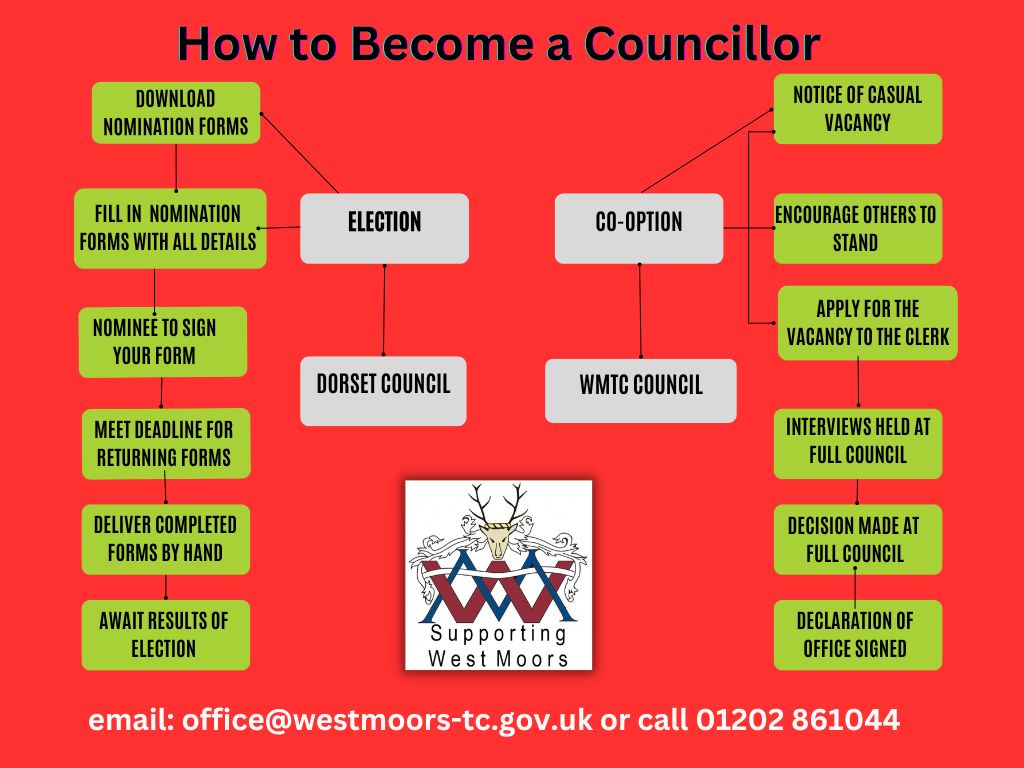The Election procedure:
Ordinary elections of local councillors take place on the first Thursday in May every four or five years. You are elected for the entire term (until the next ordinary election) unless you resign.
The next ordinary Town Council election will be held in May 2024.
Please note that there are 12 seats on West Moors Council and if only 12 or less candidates stand for election they are elected as unopposed.
You can also become a Councillor at a by-election or can be co-opted to fill a casual vacancy during the course of the 4- or 5-year term, you would then hold office until the end of the term, unless you resign from the post.
A few terms that you may encounter:
▪ Returning Officer – person empowered to run an election.
▪ Standing – Putting your name forward for election.
▪ Electoral Register – Names and addresses, together with election identification numbers of all people within a community who are registered to vote.
▪ Election Timetable – dates when specific forms must be publicised or submitted.
▪ Expenses – If you do produce your own leaflets/pamphlets you need to declare how much you have spent on this.
▪ Ensure that all addresses are in full with no abbreviations
▪ Include the whole Electoral Register references letters and numbers
▪ Be careful not to miss important dates
▪ Further information online at www.dorsetforyou.com/elections
Publication of the Notice of Election:
Notices about an upcoming election will be available on the Council website and distributed to Parish and Town clerks for them to display.
Getting the nomination forms:
Nomination forms will be available to download from the West Moors Town Council website https://www.westmoors-tc.gov.uk/ and from the Dorset Council website https://www.dorsetcouncil.gov.uk/
Completing the nomination forms:
You will need to fill in all your personal details and those of the people nominating you. You and those nominating will be asked to fill in your Electoral Register number. This is the district code on the front of the Electoral Register. This is followed by the number that appears next to your name, or next to the name of the person nominating you. The entry in this box will therefore read something like ‘WM 413’.
You must get your form completed and signed by those nominating you and it will help to copy the numbers of those nominating you when you obtain your own Electoral Register number which will be available on request from the Town Council.
Sending the nomination forms back:
It is imperative that you submit your forms in accordance with the Timetable of Proceedings. Failure to do so will render your application null and void.
Checklist:
▪ Do not forget to get everyone mentioned to sign the forms
Co-option
Town and Parish Councils are permitted to exercise the power to co-opt a person onto the Council to fill a casual vacancy when the requirements to hold an election have not been met (i.e. the vacancy has been the subject of a public notice and less than 10 registered electors have requested an election by a deadline date specified by the Dorset Council Returning Officer).
Whenever the need for co-option arises, West Moors Town Council will seek and encourage applications from anyone in the town who is eligible to stand as a town councillor. Councillors or parishioners can legally approach individuals to suggest that they might wish to consider putting their names forward for co-option
The notice to co-opt will include: the method by which applications can be made; the closing date for all applications; a contact point to obtain more information and where information can be sourced electronically.
Casual Vacancies Protocol (Adopted: 24.09.09, reviewed: Sep 2016)
